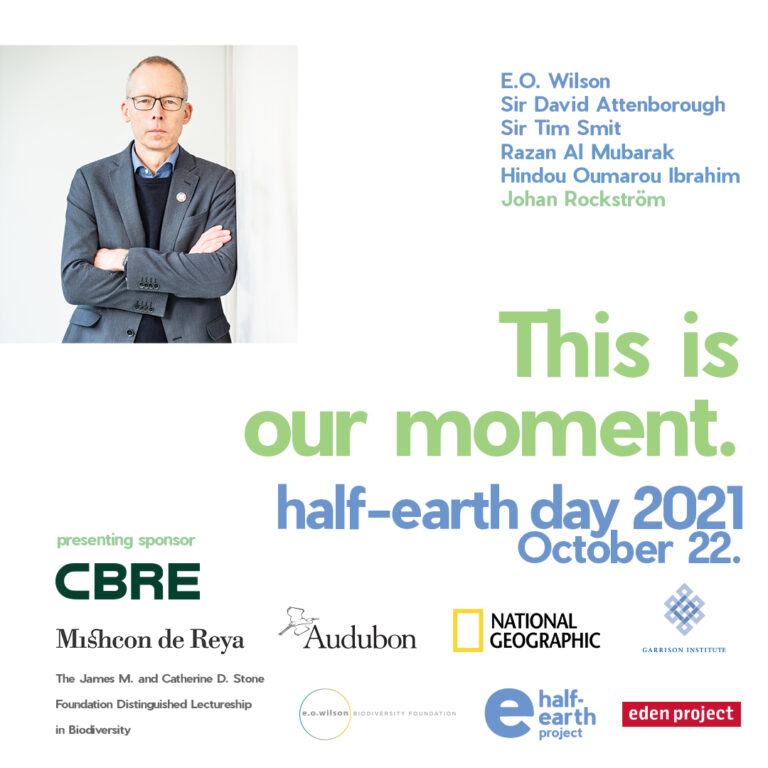

On Half-Earth Day, scientists and practitioners will discuss the priorities for area-based conservation of global biodiversity. As nations are about to finalize their commitments in the United Nations biodiversity conference, the event will offer a timely reflection on the intersection of evidence, approaches, and implementation of biodiversity conservation. The conversation will feature 12 short presentations and a keynote by Johan Rockstöm followed by a panel including Walter Jetz, Katrin Böehning-Gaese, Bill Sutherland, and Yadvinder Malhi.
Rockström, the Director of the Potsdam Institute for Climate Impact Research, will address the opportunities for biodiversity conservation to support key Earth system functions and a sustainable planet.
Biodiversity conservation critically depends on the science that underpins global decisions about the future. Half-Earth Day brings together deep scientific knowledge, experienced leadership, and inspirational engagement to motivate and create goal-driven energy to protect the Earth.
The Science & Conservation Track will feature three sessions and a plenary with over a dozen scientists from leading universities, museums, and institutes, including Yale University, the Potsdam Institute for Climate Impact Research, Royal Botanical Gardens at Kew, Oxford University, and the National Audubon Society among others.
Throughout the day, scholars, policymakers, and the public alike can engage with cutting-edge research to nurture future biodiversity stewardship and perpetuate conservation efforts worldwide. We hope you are one of them. Please find the schedule for the Science & Conservation Track below:
10 am – 10:55 am EDT / 3 pm – 3:50 pm BST
Science & Conservation 1: Evidence and Scientific Foundations
Biodiversity conservation critically depends on information about the existence and global distribution of species. This session will address these taxonomic and biogeographic foundations of conservation and highlight new data and scientific advances.
Walter Jetz, Yale University, E.O. Wilson Biodiversity Foundation
Stefan Pinkert, Yale University
Mark Costello, Nord University
Aurore Maureaud, Yale University
Callum Roberts, University of Exeter
11 am – 11:50 am EDT / 4 pm – 4:50 pm BST
Science & Conservation 2: Perspectives and Approaches
Area-based conservation in a changing world presents unique and evolving challenges and opportunities. This session will discuss approaches to measuring and identifying biodiversity change and priority areas for conservation.
Alexandre Antonelli, Royal Botanic Gardens at Kew
Andy Purvis, Natural History Museum, London
Nina Bhola, UNEP-WCMC
Katrin Böehning-Gaese, Goethe University Frankfurt
12 pm – 12:50 pm EDT / 5 pm – 5:50 pm BST
Plenary: Biodiversity conservation and the Earth system
This session features a keynote by Johan Rockström entitled “Without a healthy living biosphere, no chance of a safe climate landing for humanity”. The lecture will be followed by a panel discussion addressing the opportunities and synergies that area-based conservation provides for supporting key Earth system functions and a sustainable planet.
Johan Rockström, Potsdam Institute for Climate Impact Research (talk)
Katrin Böehning-Gaese, Goethe University Frankfurt (panel)
Bill Sutherland, St. Catherine’s College (panel)
Yadvinder Malhi, University of Oxford (panel)
Brooke Bateman, National Audubon Society
Walter Jetz, Yale University, E.O. Wilson Biodiversity Foundation (moderator)
1 pm – 1:50 pm EDT / 6 pm – 6:50 pm BST
Science & Conservation 3: Solutions for Biodiversity and People
Effective biodiversity conservation relies on support from local communities and the engagement of relevant stakeholders across scales. In our final segment, we will discuss how the scientific evidence can be used in practice to develop conservation solutions that successfully involve people.
Bill Sutherland, University of Cambridge
Julie Wraithmell, National Audubon Society
Matt Walpole, WWF

